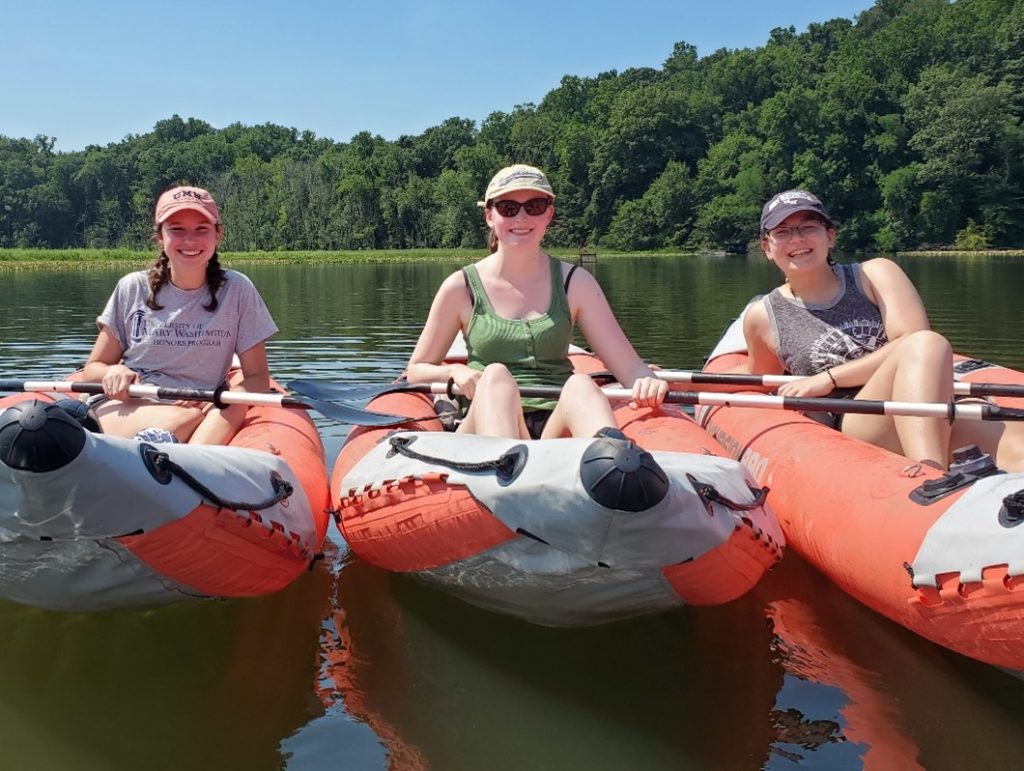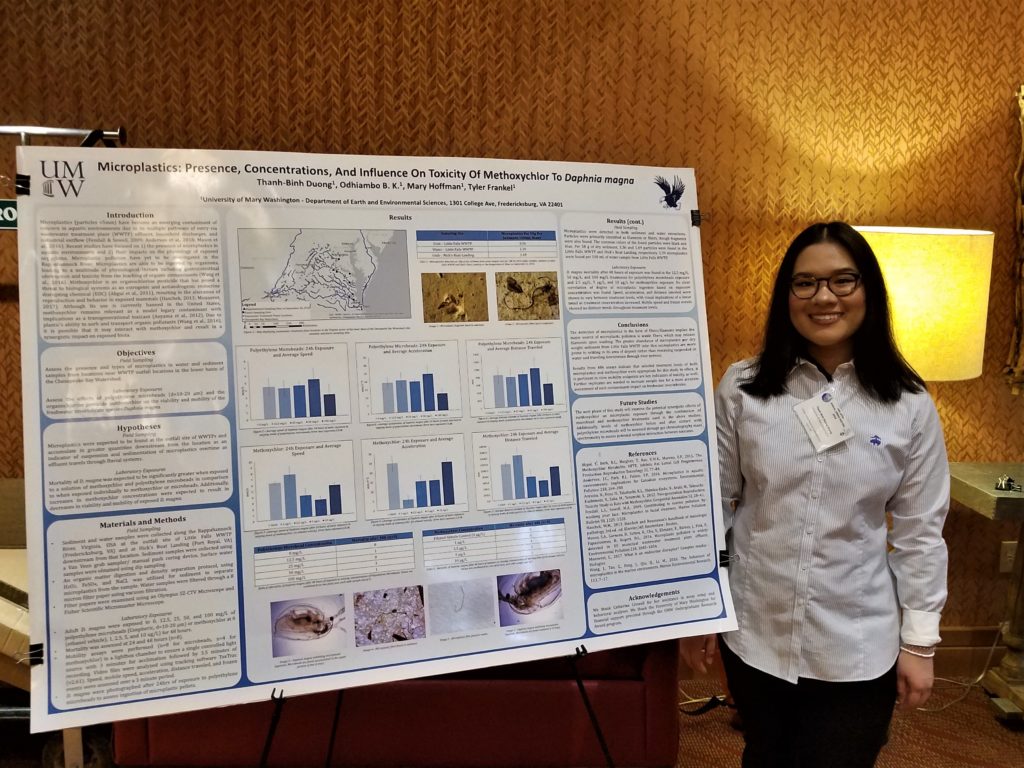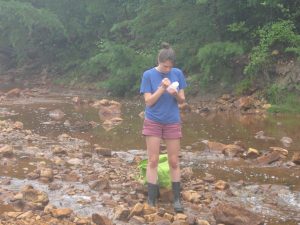More Student and Faculty Research
Many Environmental Science and Geology students choose to work with a faculty advisor on an independent research project. The choice of topic is up to you and your advisor; many students join existing faculty research projects while others pursue original ideas.
Your degree of commitment in time and effort can range from a one-credit single semester project to multi-semester comprehensive Honors research. Independent research may count for up to four (4) credits, which may be applied toward the elective credits required for your major. Any aspect of earth and environmental science can be a subject of student research. Additionally, students in EESC frequently participate in the University of Mary Washington Summer Science Institute which offers science majors an opportunity to conduct a summer-long research project supervised by a faculty member (https://cas.umw.edu/summerscienceinstitute/). Some current and recent projects…
EESC Students Receive Meeting Attendance Grants to Present at SETAC Portland
We are pleased to announce that Sophia Weldi (left – class of 2022), Catherine Crowell (middle – class of 2022), and Rina Murasaki (right – class of 2022) have each been awarded a travel grant to support their participation in the upcoming SETAC North America 42nd Annual Meeting in Portland, Oregon. Established by the SETAC NA Board of Directors in 1991, this competitive program selects awardees based on the quality of their research, career goals, and previous accomplishments. Their research focuses on examining the impacts of a wide range of anthropogenic pollutants on both terrestrial and aquatic invertebrates. Congratulations!
EESC Student Success at 2021 UMW Summer Science Institute Research Symposium
Four EESC students presented the results of their summer research projects at the UMW 2021 Summer Science Institute Symposium which was held on August 21st. Their research covered a wide range of topics, including:
- Paleoclimate analysis using growth bands and stable isotopes from mid-to-late 1700s Stratford Hall oysters – Lyra Winters (Class of 2023), Advisor: Dr. Pamela Grothe
- Assessing the Impacts of the Common Deicing Agent NaCl on the Viability, Embryonic Development, and Behavior of the Freshwater Snail Physa acuta– Sophia Weldi (Class of 2022), Advisor: Dr. Tyler Frankel
- The Effects of Coal Ash Concentration on the Development, Hatching Rate, and Reproduction in Planorbella duryi – Catherine Crowell (Class of 2022), Advisor: Dr. Tyler Frankel
- Assessing the Impacts of Neonicotinoid Pesticides on the Viability, Biomass, and Behavior of the Earthworm (Eisenia fetida) Using an Agar Medium- Rina Murasaki (Class of 2022), Advisor: Dr. Tyler Frankel
Several of these students also earned awards for their excellent presentations. Sophia Weldi (left) was awarded 1st place and Rina Murasaki (middle) was awarded 2nd place in the UMW SSI platform competition. Catherine Crowell (right) was awarded 1st place in the UMW SSI poster competition. Each 1st place winner received a generous scholarship through the John C. and Jerri Barden Perkins ’61 Summer Science Research Institute Endowment. Congratulations to our amazing students!
EESC Student Awarded Student Research Grant by GSA
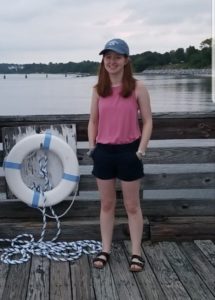
Eden Rakes (Environmental Geology, ’21) was awarded an Undergraduate Student Research Grant by the Geological Society of America. With the guidance of Dr. Grothe, Eden studies how eastern oysters (Crassostrea virginica) record environmental changes when they secrete their shells. Her research helps us further understand our changing climate and restore the Chesapeake Bay. The fully funded grant allows Eden to investigate multidecadal climate variability at Stratford Hall, which went into economic decline during the mid to late 1700s.
EESC Student Participates in Press Conference at American Geophysical Union Meeting

Allison Grant (EESC, ’20) has been quoted in a recent article titled “Climate racism is real. Researchers found it in U.S. cities” (https://www.eenews.net/stories/1063720333). Advised by Dr. Pamela Grothe, Allison’s research specifically focused on the impacts of redlining on land surface temperature in several Virginia cities. Her findings suggest that, while redlined communities are significantly warmer than non-redlined communities and the change in land surface temperature over time was not significant, the legacy of redlining has locked in these disparities and that they have existed for decades.
EESC Student Wins Award at 2020 Virtual CPRC SETAC Meeting

Catherine Crowell (EESC, ‘21) has been awarded 1st place in the 2020 Chesapeake and Potomac Regional Chapter of the Society of Environmental Toxicology and Chemistry virtual poster competition. Her presentation titled “The presence, distribution, and concentration of trace metals in the James River near a coal-burning repository” was judged by professionals in academia, governmental institutions, and private industry. Catherine’s research is mentored by Dr. Tyler Frankel (EESC), Dr. Ben O. Kisila (EESC), and Dr. Leanna Giancarlo (CHEM).
EESC Student Receives 2020 Virginia Water Environment Association (VWEA) Undergraduate Scholarship
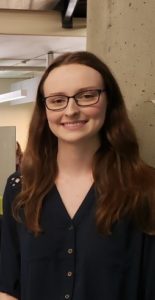
Catherine Crowell has been selected as a recipient of the 2020 Virginia Water Environment Association Undergraduate Scholarship. This competitive award is given annually to students enrolled at Virginia universities in a civil or environmental engineering or physical/environmental science undergraduate program, with selections based on each candidate’s academic performance, research experience, and extracurricular activities. Under the mentorship of Dr. Tyler Frankel (EESC), Dr. Ben Kisila (EESC), and Dr. Leanna Giancarlo (CHEM), Katie’s research centers around examining the presence of coal ash contaminants near power plants in VA and their impacts on aquatic invertebrates.
Department students present research at UMW’s 2020 Summer Science Institute
Allison Grant (Environmental Science) was among departmental students presenting the results of their summer research at UMW on July 22. Her work under the supervision of Dr. Pamela Grothe consisted of a study of the lingering environmental consequences of the now-banned discriminatory practice of real estate “redlining”. Information on other Earth and Environmental Sciences students’ summer research to follow soon!
Department graduate completes two years in Zambia with the Peace Corps
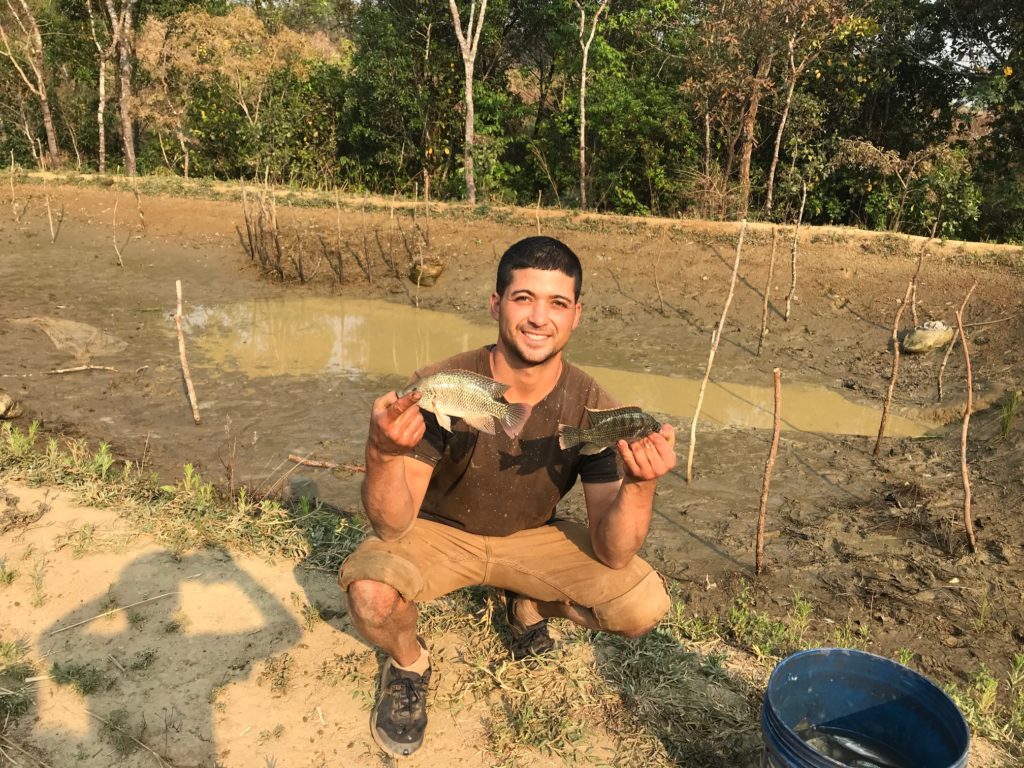
Thomas de Triquet (Environmental Science, ’17) integrated into a rural subsistence farming village and shared knowledge regarding climate-smart agriculture, sustainable forest management, and animal husbandry. He also taught adult literacy, youth environmental awareness, established a tree nursery, and encouraged food self-security within his resident population. Thomas is now planning to pursue graduate work in sustainable development.
Grant awarded to UMW faculty for environmental study at the Crows Nest Research Center in Stafford County, Virginia

Congratulations to Dr. Tyler Frankel (pictured) of the Earth and Environmental Sciences Department and Dr. Abbie Tomba of the Biology Department, who have been awarded a $16,504 grant to finance study of at the Crows Nest Research Center in Stafford County, Virginia. The research will be carried out beginning in the Summer of 2020. Click here for more details!
UMW student receives 2019 runner-up award at Geological Society of America conference in Phoenix, AZ
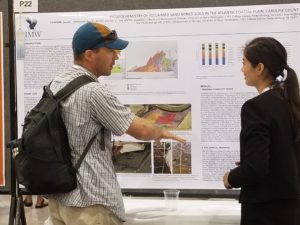
Lauren Chartier (Biology, ’20; Environmental Sustainability minor), pictured at right, won a runner up in Environmental & Engineering Geology Session – Students research presentation competition at the national annual Geological Society of America conference in Phoenix Arizona ( September 22 – 25) for her poster “The biogeochemistry of reclaimed sand-mined soils in Caroline County, Virginian Coastal plains, USA”. Lauren’s research was supervised by Dr. Ben O. Kisila (Earth and Environmental Sciences Department) and Dr. Josephine Antwii (Biology Department). Also involved with the research is Earth and Environmental Sciences graduate Dr. Matthew Ricker (now on the faculty of North Carolina State University)
Frankel and Tomba Awarded Research Grant by the Crow’s Nest Research Center
In February 2020, Drs. Tyler Frankel (EESC) and Abbie Tomba (BIOL) were awarded a $16,504.90 research grant by the Crow’s Nest Research Center, a non-profit organization located in Stafford, VA. Along with several UMW students, Drs. Frankel and Tomba will be investigating:
- The longitudinal presence and concentrations of excess nutrients (nitrogen and phosphorus) in Accokeek Creek and surrounding surface waters near the Crow’s Nest Natural Area Preserve and the Crow’s Nest Research Center and any potential impacts on various abiotic factors (dissolved oxygen, pH, etc.)
- Changes in aquatic macroinvertebrate populations and fish populations in Accokeek Creek and associated surface waters over time
- The potential impacts on viability, reproduction, and behavior of aquatic invertebrates using Daphnia magna to predict mortality of invertebrates inhabiting receiving waters
This research will be begin during the Summer of 2020. Funds from this grant will support student travel to present the results of this research project at local and national conferences.
EESC Students Present at Chesapeake Potomac Regional Chapter of the Society of Environmental Toxicology and Chemistry Spring Meeting
Thanh-Binh Duong (’20; at right above) and Mary Hoffman (’20; at left) recently presented the results of their independent research projects at the Chesapeake Potomac Regional Chapter of the Society of Environmental Toxicology and Chemistry Spring Meeting in Canaan Valley, WV. The conference included professionals from private industry, academia, and government agencies who are engaged in the study and analysis of environmental problems, management and regulation of natural resources, and/or research and development. Binh’s presentation was titled “Microplastics: Presence, concentrations, and influence on toxicity of methoxychlor to Daphnia magna” and has been conducted under the mentorship of Drs. Tyler Frankel and Ben Kisila. Mary’s presentation was titled “Assessing the effects of sulfoxaflor on the physiology, reproduction, and behavior of Daphnia magna” and has been conducted under the mentorship of Dr. Frankel.
Environmental Geology student and faculty adviser study climate variability as recorded in ancient equatorial Pacific coral reefs
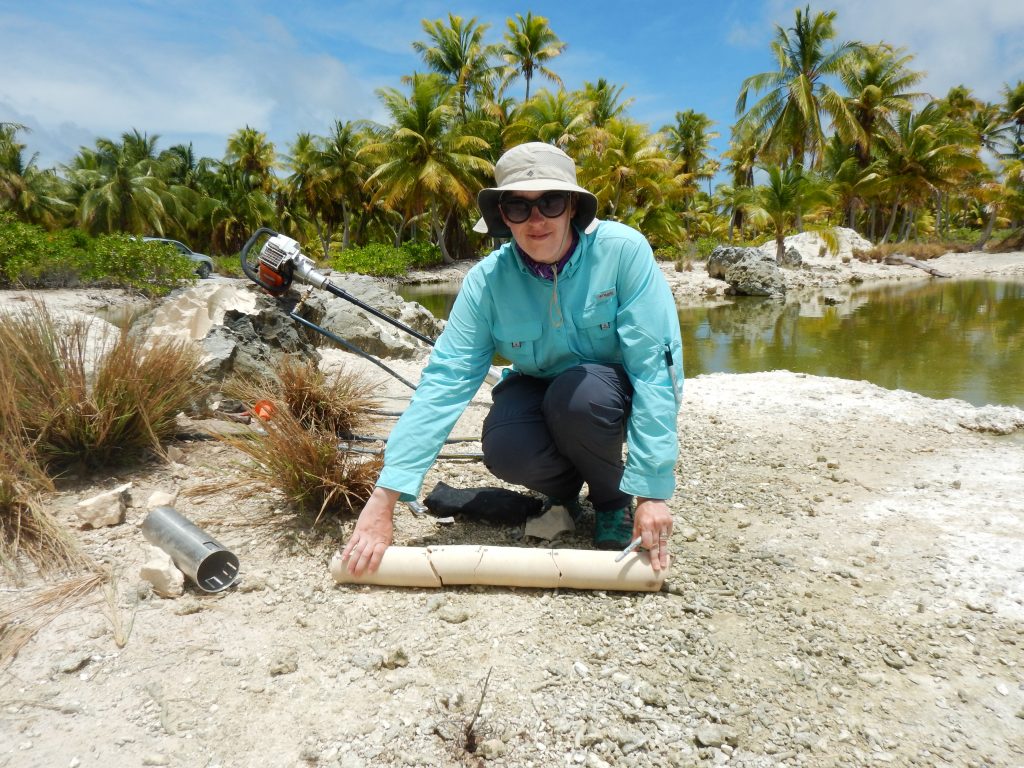
In March of 2018, Assistant Professor Dr. Pamela Grothe and senior Environmental Geology major Andrea Moore (pictured above with a core sample) visited Kiritimati (Christmas Island) to collect fossil corals and seawater samples for use in paleoclimate reconstruction as part of an ongoing project in collaboration with scientists from Georgia Tech and other institutions. Moore plans to use data from a 5,000-year-old Porites sp. core recovered from the island as part of her Honors Thesis project in 2018/2019.
Department students are conducting a study of possible soil and surface water contamination in central Virginia
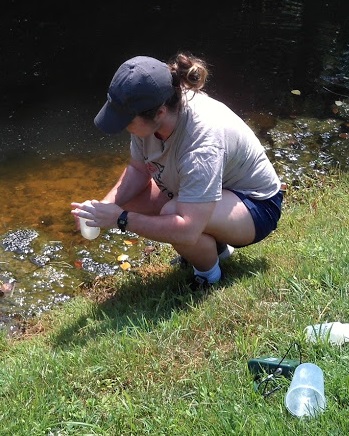
Geology major Abby Friedman (pictured to the right)and environmental science major Sarah Jordan are currently conducting a study of possible metals contamination in soils and water in selected central Virginia public buildings, public parks, and golf courses. This research is being conducted under the supervision of Dr. Melanie Szulczewski. Soils are being analyzed for bioavailable metals, total metals, pH, organic matter, as well as sand, silt, and clay content. Bioavailable metals are extracted with an ammonium bicarbonate-diethylene triamine pentacetic acid (AB-DTPA) solution; total metals are extracted by acid digestion. Concentrations of aluminum, arsenic, cadmium, cobalt, chromium, copper, iron, manganese, nickel, lead, selenium, and zinc are being determined with UMW’s Inductively Coupled Plasma-Atomic Emission Spectroscopy (ICP-AES) instrument. Organic compounds are being quantified using our departments new High Performance Liquid Chromatography (HPLC) instrument. Results of this study could indicate areas and sources of concern for environmental and human health in the region. Results will be presented at professional conferences and at UMW’s annual campus-wide research symposium.
Environmental Science students study the effects of acid mine drainage on a Virginia ecosystem
Environmental Science students Susanna Kirschner (above left) and Jenna Stockton (above right) studied the effects of acid mine drainage (AMD) on the overall health of a stream ecosystem draining an area of former pyrite (iron sulfide) mines in east-central Virginia. Working under the supervision of Dr. Melanie Szulczewski, they have quantified heavy metal concentrations and other chemical and physical parameters in soils surrounding AMD-impacted Contrary Creek in Louisa County. An important aspect of their work is use of a sequential extraction procedure that successively releases metal ions from soil samples according to their mobility, a process that indicates the relative stability and bioavailability of the ions. This year, they are expanding work to include analyses of sulfur compounds that may be present in the soils. Data collected to date indicate the soils are generally acidic (low pH) with high concentrations of certain heavy metals. Current research is examining relationships among different parameters at the site (e.g. high acidity, sulfate concentrations, heavy metal concentrations) for possible correlations and relationships to AMD.
Other recent projects…
A few examples of recent student/faculty collaborative Environmental Science projects:
- Study of the Macrobenthic Community of Hazel Run, Spotsylvania County,Virginia
- Sediment, soil, and stream water contamination at an acid-mine drainage site in Louisa County, Virginia
- Study of Forested Riparian Buffer for Reduction of Non-Point SourcePollution in the Rappahannock River Basin
- Preliminary Ecological Assessment of Massaponnax Creek, Spotsylvania County, Virginia
- Ecological studies within the proposed Celebrate Virginia site
Recent examples of independent Geology and Environmental Geology student research:
- Mesozoic Faulting in Culpeper, Virginia
- Controls on Ion Migration in Soils
- GPS Survey of Prince William Park
- Digital Mapping and GIS Applications
- Geothermometry of Virginia Piedmont Metamorphic Rocks
- Urbanization and Enhanced Storm Hazards
- Analysis of Metamorphic Fabrics in the Fredericksburg, Virginia Area
- Lithospheric Plate Velocities
- Source of Arsenic Contamination in Groundwater
- Quantitative Evaluation of GIS Terrain Models
- Development of dolomite in arid Hawaiian soils
Current Earth and Environmental Sciences students should contact individual faculty members regarding research opportunities. Prospective students, please contact department chair Dr. Jodie Hayob for more information about any of our programs.
